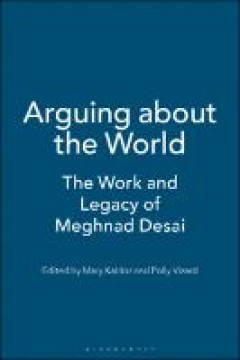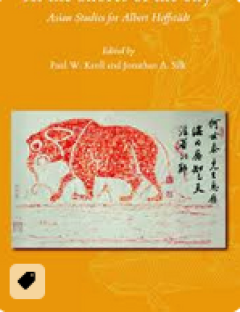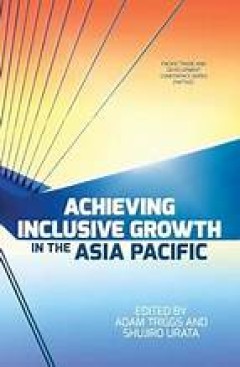Filter by

Beyond Empire and Nation; The Decolonization of African and Asian societies, …
The decolonization of countries in Asia and Africa is one of the momentous events in the twentieth century. But did the shift to independence indeed affect the lives of the people in such a dramatic way as the political events suggest? The authors in this volume look beyond the political interpretations of decolonization and address the issue of social and economic reorientations which were nec…
- Edition
- -
- ISBN/ISSN
- 9789004260443
- Collation
- 291
- Series Title
- -
- Call Number
- -

Arguing about the World
This book is available as open access through the Bloomsbury Open Access programme and is available on www.bloomsburycollections.com. 'The breadth of Meghnad Desai's research interests is awe-inspiring. Hence it is no surprise to see so many who are at the forefront of their respective areas represented in this volume . . . a real treat.' Sunil Wadhwani, CBE, former member of the Monetary Polic…
- Edition
- -
- ISBN/ISSN
- 9781849665452
- Collation
- oer.unej.ac.id
- Series Title
- -
- Call Number
- National liberation and independence

"The Neolithic Settlement of Aknashen (Ararat valley, Armenia)"; Excavation s…
Permukiman Neolitik Aknashen (Lembah Ararat, Armenia): Musim Ekskavasi 2004-2015 adalah monograf pertama yang didedikasikan untuk periode Neolitik di Armenia. Penelitian ini didasarkan pada proyek Armenia-Prancis, yang juga melibatkan spesialis dari Kanada, Rumania, Jerman, dan Yunani. Volume ini membahas lingkungan alam, budaya material, dan ekonomi subsisten penduduk paruh pertama milenium ke…
- Edition
- -
- ISBN/ISSN
- 9781803270036
- Collation
- 1 online resource
- Series Title
- -
- Call Number
- 939.95 BAD n

"At the Shores of the Sky"; Asian Studies for Albert Hoffstädt
Albert Hoffstädt, seorang klasikus berdasarkan pendidikan dan humanis multibahasa berdasarkan kecenderungan, telah selama 25 tahun menjadi editor yang terutama bertanggung jawab untuk pengembangan dan akuisisi manuskrip dalam Studi Asia untuk Brill. Selama waktu itu, ia telah membimbing lebih dari 700 buku untuk dicetak dan telah membedakan dirinya sebagai sosok dengan kewaspadaan dan wawasan …
- Edition
- -
- ISBN/ISSN
- 9789004438200
- Collation
- 1 online resource (313 p.)
- Series Title
- Sinica Leidenia
- Call Number
- 950 KRO a

Private Yokoi's War and Life on Guam, 1944–1972; The Story of the Japanese …
Pada tahun 1972, ketika ditemukan oleh pemburu lokal di Guam, mantan penjahit Yokoi dilaporkan secara luas sebagai 'manusia yang tidak menyerah' yang selamat, menghayati kode kehormatan tentara Jepang yang lama. Buku ini tentang realitas seorang pria seperti itu (dan kecerdikan yang ia terapkan untuk memastikan kelangsungannya), yang sangat berbeda dari stereotip. Buku ini memberikan sudut pand…
- Edition
- -
- ISBN/ISSN
- 9789004213043
- Collation
- online resource (, p.)
- Series Title
- -
- Call Number
- 940.5426 HAT p

Achieving Inclusive Growth in the Asia Pacific (Paftad)
The world’s developed economies are experiencing a sharp backlash against globalisation, and it appears to be contagious. Will Asia catch it next? Asia has seen spectacular growth in recent decades. It has benefited substantially from global trade, finance, openness and the rules-based international order. But much of the growth Asia has enjoyed has not been shared. It has not been inclusive …
- Edition
- -
- ISBN/ISSN
- 978-1760463816
- Collation
- oer.unej.ac.id
- Series Title
- -
- Call Number
- -

Peaceful Maritime Engagement in East Asia and the Pacific Region
Keterlibatan Maritim yang Damai di Asia Timur dan Wilayah Pasifik mencakup kontribusi dari tokoh-tokoh paling berpengaruh dalam hukum laut untuk memberikan konteks dan arah dalam mengembangkan tata kelola maritim di Asia Timur dan Samudera Pasifik. Pengelolaan sengketa yang damai mencakup kerja sama dalam penambangan dasar laut, negosiasi untuk instrumen yang mengikat secara hukum mengenai kean…
- Edition
- -
- ISBN/ISSN
- 9789004518629
- Collation
- online resource ( XXVI, 446 Pages)
- Series Title
- Pusat Hukum dan Kebijakan Kelautan
- Call Number
- 327.17095 KRA p

Norms beyond Empire; Law-Making and Local Normativities in Iberian Asia, 1500…
Norma di luar Kekaisaran berusaha untuk memikirkan kembali hubungan antara hukum dan kekaisaran dengan menekankan peran dari produksi norma lokal. Sementara imperialisme Eropa sering dipandang mampu membentuk hukum dan pemerintahan kolonial sesuai citranya, volume ini berargumen bahwa kekaisaran awal modern tidak pernah dapat mengontrol secara monolitik bagaimana proses tersebut berlangsung. De…
- Edition
- -
- ISBN/ISSN
- 9789004472839
- Collation
- online resource ( XII, 355 Pages)
- Series Title
- Studi Max Planck tentang Sejarah Hukum Global Dunia Iberia
- Call Number
- 340.55095 SAA n

Access Contested Security, Identity, and Resistance in Asian Cyberspace
Experts examine censorship, surveillance, and resistance across Asia, from China and India to Malaysia and the Philippines. A daily battle for rights and freedoms in cyberspace is being waged in Asia. At the epicenter of this contest is China—home to the world's largest Internet population and what is perhaps the world's most advanced Internet censorship and surveillance regime in cyberspace.…
- Edition
- -
- ISBN/ISSN
- 9780262016780
- Collation
- oer.unej.ac.id
- Series Title
- Information Revolution and Global Politics,
- Call Number
- Network security

2050 China: Becoming a Great Modern Socialist Country
This book is open access under a CC BY-NC-ND 4.0 license. This book is arranged and developed around the theme of “2050 China,” it analyzes the factors and advantages of the Chinese road to socialist modernization, explores and summarizes the development goal and the basic logic of the socialist modernization of China, and further shows the general basis of the primary stage of socialism. A…
- Edition
- -
- ISBN/ISSN
- -
- Collation
- -
- Series Title
- -
- Call Number
- -
 Computer Science, Information & General Works
Computer Science, Information & General Works  Philosophy & Psychology
Philosophy & Psychology  Religion
Religion  Social Sciences
Social Sciences  Language
Language  Pure Science
Pure Science  Applied Sciences
Applied Sciences  Art & Recreation
Art & Recreation  Literature
Literature  History & Geography
History & Geography